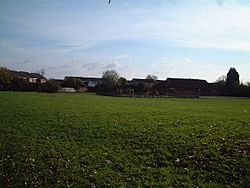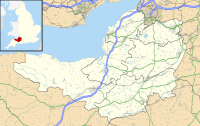Castle Batch facts for kids
Quick facts for kids Castle Batch |
|
|---|---|
| Somerset, England | |

Site of Castle Batch
|
|
| Coordinates | 51°22′08″N 2°55′06″W / 51.3688°N 2.9182°W |
| Type | Motte, possible motte and bailey or ringwork |
| Site information | |
| Open to the public |
Yes |
| Condition | Only earthworks remain |
Castle Batch was an old fort or castle in Worle, a village near Weston-super-Mare in Somerset, England. It was built on a hill, looking over the land around it. Today, you can still see the remains of its earthworks.
Contents
What Was Castle Batch?
Castle Batch was a type of castle called a motte. A motte is a large mound of earth, often with a wooden tower on top. It was built by a powerful Norman lord named Walter of Douai. He built it sometime between 1066, when the Normans took over England, and 1086.
The castle was placed on a high ridge, which is like a long, narrow hill. The mound itself is about 3 meters (10 feet) high and 42 meters (138 feet) wide. It was surrounded by a ditch that was up to 10 meters (33 feet) wide. The main way to get into the castle was probably from the north side.
Motte, Bailey, or Ringwork?
Historians think Castle Batch might have also had a bailey. A bailey is a walled courtyard next to the motte, where soldiers and people lived.
Even though it's usually called a motte, some experts think it might have been a ringwork instead. A ringwork is a circular fort with a ditch and a bank, but without a tall mound like a motte. The mound at Castle Batch has a small dip in the middle, which makes archaeologist Stuart Prior think it could have been a ringwork.
Who Owned Castle Batch?
Around the year 1200, the land where Castle Batch stood belonged to a person named William De Courtney. Later, by 1303, it was owned by John de Beauchamp. These were important families in England at the time.
Castle Batch Today
Today, the site of Castle Batch is part of a local park. It's a protected historical site, known as a scheduled monument. This means it's important and kept safe by law so people can learn about its history.
 | Valerie Thomas |
 | Frederick McKinley Jones |
 | George Edward Alcorn Jr. |
 | Thomas Mensah |


